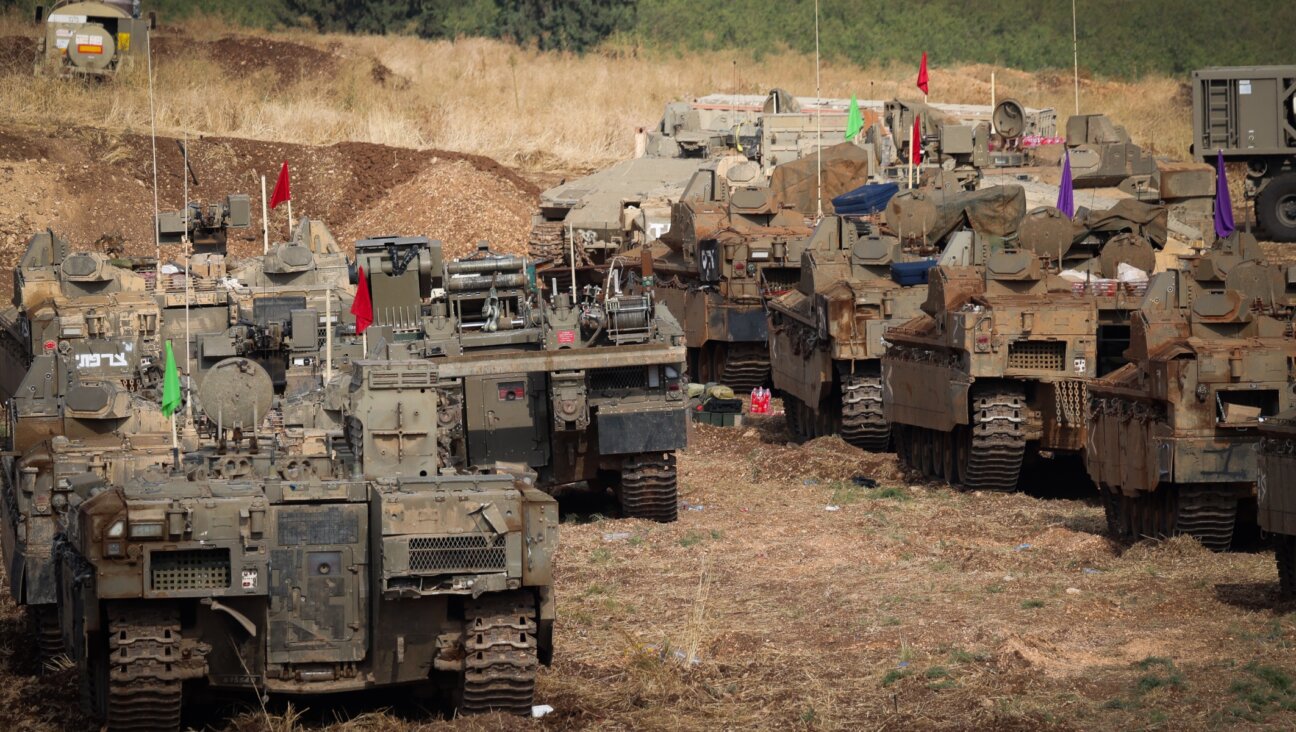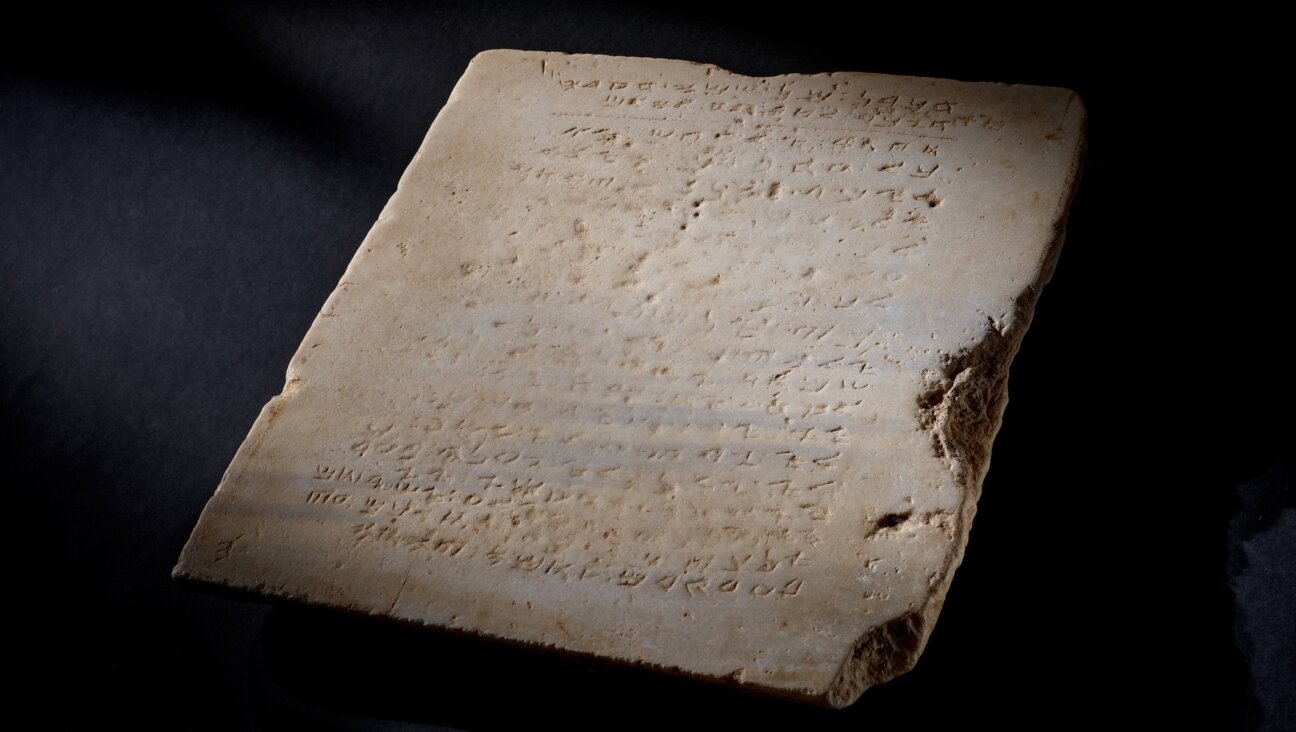Israeli Air Strike Kills Three Hamas Commanders in Gaza

Hamas Leader: Raed Al-Attar, left, seen in image of Gilad Shalit’s release from Hamas abduction, October 2013. Image by Haaretz
Israel killed three senior Hamas commanders in an air strike on the Gaza Strip on Thursday, the clearest signal yet that Israel is intent on eliminating the group’s military leadership after a failed attempt on the life of its top commander this week.
Hamas, which dominates Gaza, named the men as Mohammed Abu Shammala, Raed al-Attar and Mohammed Barhoum and said they were killed in the bombing of a house in the southern town of Rafah. All three were described as senior Hamas military figures.
The Israeli military and Shin Bet, the internal security service, confirmed that two of the men were targeted, in what would constitute the killing of the most senior Hamas leaders since Israel launched its offensive in Gaza on July 8.
Israeli Prime Minister Benjamin Netanyahu praised the “outstanding intelligence” and said in a statement the Hamas leaders “planned deadly attacks against Israeli civilians.”
After six weeks of conflict in which more than 2,000 Palestinians have been killed, most of them civilians, Israeli air strikes since a 10-day ceasefire collapsed on Tuesday appear to have been focused more intently on Hamas’s armed wing.
Late on Tuesday, the Israeli air force bombed a house in northern Gaza, an attempt, Hamas said, to assassinate Mohammed Deif, its top military commander. Deif’s wife and seven-month-old son were killed but Deif escaped, Hamas said.
After Thursday’s air strike, hundreds of Palestinians rushed to the site in southern Gaza calling for revenge.
“The assassinations of the three Qassam leaders is a grave crime,” Hamas spokesman Sami Abu Zuhri told Reuters. “But it will not break our people and Israel will pay the price for it.”
Shin Bet said Abu Shammala was head of Hamas’s southern command and described al-Attar as a brigade commander. It said both had been leading and coordinating fighting against Israel in the south of Gaza, where some of the most intense combat has occurred. Israel has lost 64 soldiers in the conflict, while three civilians in Israel have also been killed.
At a news conference on Wednesday, Netanyahu declined to say whether Deif had been targeted, but said militant leaders were legitimate targets and that “none are immune” from attack.
NO END IN SIGHT
Israel launched its offensive last month with the declared aim of curbing Palestinian rocket fire into its territory.
After nearly four weeks of conflict, including ground operations by Israeli forces, Egyptian mediators succeeded in brokering a truce. But after 10 days of relative calm, that ceasefire was shattered on Tuesday, when Hamas launched more than 200 rockets into Israel, leading to Israeli air strikes.
Rocket fire from Gaza continued on Thursday, with several landing in a kibbutz close to the border. Shrapnel from the blast seriously injured one Israeli and narrowly missed a kindergarten, Israel’s ambulance service said.
Egypt said it would continue contacts with both sides, whose delegates left Cairo after hostilities resumed. Yet there appears to be little chance in the current circumstances of putting an end to fighting and making progress on peace talks.
Netanyahu said fighting could go on for a long while.
“This will be a continuous campaign,” he told reporters.
When it launched its initial assault, Israel said the aim was to put an end to Hamas rocket fire. Ten days later it sent ground forces in to destroy cross-border tunnels used by Hamas militants to launch surprise attacks on Israelis.
More than 30 of those tunnels have been destroyed and no tunnel-based attacks have taken place in the past 10 days. Israel pulled its ground troops out of Gaza on Aug. 5.
As well as the Hamas commanders killed, Palestinian medics reported 19 other deaths on Thursday, including three children.
Hamas’s military wing has threatened to target Israel’s Ben-Gurion International Airport and warned airlines to stay away on Thursday morning. Hamas said it had fired a rocket towards the airport, but an Israeli airport spokesman said there were no disruptions reported to Thursday’s flight schedules.
Israel says its main gateway is protected against Hamas’s inaccurate rockets, many of which have been shot down by the Iron Dome missile interceptor.
Hamas has said it will keep up its fight against Israel until the Israeli-Egyptian blockade on the Gaza Strip is lifted. Both countries view Hamas as a security threat and are reluctant to make sweeping concessions without Hamas downing its arms.
The Egyptian-led peace talks had looked to be making some progress towards a relaxation of the blockade, but Israel wanted guarantees no weapons would enter the territory.
Israel says it has killed hundreds of frontline Gaza militants in its campaign. The commanders targeted on Thursday were the most senior Hamas men killed since November 2012, when the assassination of military chief Ahmed al-Jaabari triggered an eight-day cross-border war.
According to Shin Bet, Abu Shammala and al-Attar, were among those who planned and led the 2006 capture of Israeli soldier Gilad Shalit, who was held in Gaza for five years until his release in return for more than 1,000 Palestinian prisoners.
A message from our CEO & publisher Rachel Fishman Feddersen

I hope you appreciated this article. Before you go, I’d like to ask you to please support the Forward’s award-winning, nonprofit journalism during this critical time.
We’ve set a goal to raise $260,000 by December 31. That’s an ambitious goal, but one that will give us the resources we need to invest in the high quality news, opinion, analysis and cultural coverage that isn’t available anywhere else.
If you feel inspired to make an impact, now is the time to give something back. Join us as a member at your most generous level.
— Rachel Fishman Feddersen, Publisher and CEO























